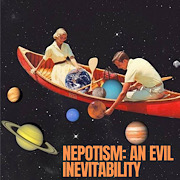|
So Bitcoins have been a thing people laugh at for awhile, but where did they come from? What exactly was it that made bitcoin popular and not some other fiat currency that would never work, and why is bitcoin so dumb? I don't know anything about economics but I know bitcoin's value fluctuates wildly though no idea why.
|
|
|
|
|

|
| # ? Apr 18, 2024 10:47 |
|
BitCoins were supposed to not be a fiat currency. The idea was that every BitCoin has a "key" that is unique to it. You transfer that key around and that transfers the coins. You "mine" for BitCoins by basically sending randomly generated numbers (really freaking big ones) to the code and it tells you if you "found" a coin or not. The idea is that BitCoins are finite in number, much like gold. It was supposed to be a way to recreate the gold standard for enlightened lolbertarians that Understand Things. (hint: they're mostly idiots) Some time in the 22nd century the idea is that the number of BitCoins in existence will be limited to a little over 20 million, which puts a hard cap on how many there actually are. The idea, really, is that BitCoins would become the medium of exchange by being a new gold standard. Which is loving stupid in that gold actually exists. You can't just program new gold into existance. Now, it's worth mentioning that BitCoins were completely digital and the software it ran on was open source. A bunch of other stupid digital currencies cropped up, which ultimately devalued BitCoins, kind of. BitCoin has existed for five years but has already spun off so many other dumbass cryptocurrencies that I don't even know how many there currently are. The reason that the price kept going up and down was because BitCoins were completely, totally, 100% unregulated. Now you can imagine the problems that that led to. BitCoins being stolen wasn't investigated because they're not actual money, leading them to not being actual crime. Currency manipulation was utterly loving rampant and the software being open source led to it being hacked into oblivion and back. Security holes were everywhere, which led to some greedy assholes exploiting that to create artificial demand to drive the price up. They then cashed out. Whoops! Because they were unsecured, deregulated, and didn't have laws tied to them that real currency had they also became kind of a black market exchange as well. They were utterly untraceable on top of that so if you were paid in BitCoins they may not have even been real. The libertarian dream of completely financial freedom was ultimately ruined by nonstop fraud, theft, manipulation, and graft. Eventually the price tanked when the deliberately inflated bubble popped. More than once. A few early adopters got fairly wealthy on them as they blew up in popularity among internet lolbertarians. At that point they were little more than a neat curiosity. The other snag was that it was easier to find blocks of coins, and the blocks were larger, when "mining" early in their life. Once the bandwagon hit fewer and fewer people scored big. This led to people creating their own digital currencies to score big on their little cryptomarkets of idiocy and broken dreams. This served to severely oversaturate the cryptocurrency market, much like would happen if there was suddenly a way for everybody to create infinite gold if there was still a gold standard. The other really, exceptionally stupid thing was that a ton of people would create a new currency then give themselves massive blocks of coins without really telling anybody. It would be like somebody buying up all the wood then trying to force everybody else onto a wood standard. Really, it doesn't take much to understand why BitCoin was stupid and why it did what it did. The idea of creating a "new gold standard" was a failure. The reason gold is valuable is because of supply and demand. Gold is rare and people want it. That gives it value, but it tends to fluctuate and that fucks up everything else. Worse yet whoever has a lot of gold can use it to manipulate all the markets by manipulating gold. Fiat currency works because it effectively puts the market on an "everything standard." As in, if you want money, the only thing you need to do is have something of value that can be exchanged. That can be gold, land, shirts, your skills and time, whatever. So long as somebody is willing to give you money for something you have you have something that has value. Keeping the amount of currency controlled by a government authority reduces market manipulation by those that have a lot of whatever the standard is. This also makes market manipulation much more difficult as you could not, for example, hoard gold to deliberately stymie the economy, buy up a bunch of poo poo, then deliberately flood the market with your reserves to devalue gold again. The lolbertarians that were screaming about regulation also frequently discovered, of then the hard way, why those regulations existed in the first place. A lot of the madness going on behind the BitCoin world is extremely illegal in the real world. A lot of the stuff that happened with BitCoin would be what would have happened if the alchemists had actually managed to figure out how to turn lead to gold. poo poo would have gone insane for a while then, next thing you know, gold would have been a joke with no actual value. ToxicSlurpee fucked around with this message at 10:33 on Aug 5, 2014 |
|
|
|
I don't know how stupid of a question this might be, but why did computers that mined bitcoins needs so many high-end video cards running inside of them?
|
|
|
|
Liar posted:I don't know how stupid of a question this might be, but why did computers that mined bitcoins needs so many high-end video cards running inside of them? I know nothing about bitcoins itself, but I do known they used an algorithm to check numbers, random or not, to see if you made a block of coins. Video cards are made up of hundreds of cores that are basically just designed to crunch numbers. Most video cards do at least 1.5+ Teraflops (Tera being the same as Terabyte or Terahertz if we ever get there, flops being floating point operations) while general CPUs in your computer are more general in nature and do about a tenth of that normally. You could easily do what the video cards do with just your CPU (assuming the programs work without them, but lets pretend they do) but it would just be so much slower.
|
|
|
|
Liar posted:I don't know how stupid of a question this might be, but why did computers that mined bitcoins needs so many high-end video cards running inside of them? It has to do with how video cards work. The short of it is that a video card is basically a bunch of processors that all run the same algorithm but in parallel. You can feed each processor different data and different numbers so long as it's all the same algorithm. So, BitCoin miners would feed a bunch of video cards the mining algorithm and the cards would puke out the numbers, relatively few of which would give them BitCoins. It didn't matter what was doing the crunching and video cards were perfect for it. Far as I know the intent was that people would use their computers' spare processes to dig in the background but a lot of people wanted to maximize their chances of getting blocks so they would sink poo poo loads of money into lots and lots of video cards.
|
|
|
|
ToxicSlurpee posted:Far as I know the intent was that people would use their computers' spare processes to dig in the background but a lot of people wanted to maximize their chances of getting blocks so they would sink poo poo loads of money into lots and lots of video cards. This is what I always found insane about miners. I'd hear about people dumping thousands into systems, and then to add of that their power bills would go through the roof running the drat things. Then I imagine the systems would be like a furnace, needing crazy cooling which would only require more power. I had to question how you made any serious money when your initial investment was basically all the money.
|
|
|
|
The generic answer to a lot of Bitcoin questions and the problems therein is: "Bitcoin was originally an academic toy for some interesting ideas about cryptography and how to apply them to money. It was never meant to be implemented at anywhere near the size of a national or even a local currency, or indeed in any way whatsoever, and so has problems typical of bleeding-edge technology. It was then latched onto by people who didn't think a single inch past 'money you can make via running your computer all day'." Everything stemming from that is a fascinating study on the sunk cost fallacy, greed, self-imposed blinders and probably a whole lot of other sociological tickboxes.
|
|
|
|
Liar posted:This is what I always found insane about miners. I'd hear about people dumping thousands into systems, and then to add of that their power bills would go through the roof running the drat things. Then I imagine the systems would be like a furnace, needing crazy cooling which would only require more power. I had to question how you made any serious money when your initial investment was basically all the money. It was a gold rush, plain and simple. The people who were that obsessively stupid about it were people that got in on it too late to make any quick cash, for the most part. A few people became millionaires within a few years thanks to BitCoin but they were just that; a few people. It's an interesting thing to watch and I've been following it for...I don't know, a few years now, partly because the only reason BitCoin has any value at all is because enough people decided that it should. Most of them were deluded fools that thought they were going to be economic powerhouses in a future ButtCoin-based economy but still...you see a lot of parallels to every other economic bubble in the history of forever, every gold rush in the history of forever, and also a poo poo load of snake oil salesmen.
|
|
|
|
When you say "a few people got rich" you have to understand the reason that Bitcoin is called a Ponzi scheme; it's zero sum. Early adopters, ie, people who mined a bunch while it was easy and as such have a lot of money on paper, need to convert it to something useful: currency. So far, the only reliable (sort of) group of people willing to buy Bitcoin believe Bitcoin will continue to increase in value. This is not sustainable! Someone will wind up holding the bag.
|
|
|
|
I remember the dicussions back when the original white paper was released. The general opinion was that Bitcoin was an interesting experiment that could lead to a useful payment system after a few iterations. Then suddenly everything went libertarian and crazy. A section on Bitcoin's precursors from a recent article on IEET: Nikki Olson posted:Bitcoin was not “out of nowhere”, socially or technologically, in spite of how it may have seemed as such. Rather, there have been several attempts at exchange mechanisms like Bitcoin dating back into at least the 1990s, and preceding social movements and Internet culture to match them. For example, the “cypherpunks”, an activist movement that promotes the development and widespread use of strong cryptography as a means of social and political change, organized in the early 1990s. Cypherpunk philosophy was quite obviously influenced by more longstanding and historical counter-cultures and ideologies, including opposing views of fiat currency, and evidence of illegitimate surveillance. David Chaum’s 1985 paper, Security without Identification: Transaction Systems to Make Big Brother Obsolete (http://www.chaum.com/articles/Security_Wthout_Identification.htm), which discussed the prospect and digital means to currency without government, has been characterized as a direct springboard for the cypherpunk movement (http://randomwalker.info/publications/crypto-dream-part1.pdf).
|
|
|
|
Anatharon posted:So Bitcoins have been a thing people laugh at for awhile, but where did they come from? Bitcoins were originally a neat idea for a mathematically-backed currency. They're functionally pogs, or shells, or tokens, or whatever useless thing you can think of that is worth something to someone because both parties agree that it can be used for a medium of trade. They can't be counterfited, and their exchange is more or less decentralized and anonymous. Bitcoin users at this stage: Crypto Geeks There are obvious implications for a decentralized, quasinonymous internet currency. Infrastructure began to develop in the black market. Bitcoin users at this stage: Crypto Geeks, People Who Buy Drugs Off The Internet, Russian Mafia As bitcoin became more popular and well known, libertarians started dreaming big. What if, like, you didn't just buy weird bath salts and uncut heroin with bitcoins, but, like, hot dogs and car washes? You could avoid paying taxes (theft) altogether! Bitcoin users at this stage: Crypto Geeks, People Who Buy Drugs Off The Internet, Russian Mafia, Anti-Government Techno-Libertarians As the number of bitcoin users continued to snowball, the price started going up. This created an irresistable allure for people who find free magic internet money appealing. People began to mine bitcoins speculatively, anticipating future use through rising prices rather than current use as internet fun bucks. Bitcoin users at this stage: Crypto Geeks, People Who Buy Drugs Off The Internet, Russian Mafia, Anti-Government Techno-Libertarians, Shiftless Captains of Industry Of course, as a bitcoin financial market developed there was an increase in speculators - people who didn't want to invest in horrifying frankenrigs, but wanted to ride the bitcoin train to easy riches. There was also an increase in people who just wanted to get in the market to fleece those less capable than them. Bitcoin users at this stage: Crypto Geeks, People Who Buy Drugs Off The Internet, Russian Mafia, Anti-Government Techno-Libertarians, Shiftless Captains of Industry, People Who Think The Stock Market Isn't Enough Of A Shell Game Once the price started going totally apeshit, the mass media picked up the story and exposed bitcoins to all sorts of non-tech savvy people who love throwing their money at dumb poo poo in the hopes of a quick buck. Bitcoin users at this stage: Crypto Geeks, People Who Buy Drugs Off The Internet, Russian Mafia, Anti-Government Techno-Libertarians, Shiftless Captains of Industry, People Who Think The Stock Market Isn't Enough Of A Shell Game, People Who Right Click To Cut And Paste Then the market collapsed and it's the biggest sunk cost fallacy of our decade. Plenty of people still mine/play the market because of apocryphal tales of riches, even though you're far more likely to get all your money taken unless you know enough to be a money taker. Anatharon posted:What exactly was it that made bitcoin popular and not some other fiat currency Early adoption. Bitcoin is the first 'cryptocurrency'. Also bitcoin isn't fiat - fiat means 'backed by government regulation' A dollar is worth a dollar because the US government establishes the value of a dollar through various means. Bitcoins are backed by their integrity as a single unit of currency, which is verified through arbitrary mathematics. They're functionally the same thing except one is backed up by the Federal Government and the US Economy while the other is backed up by a computer process an anonymous person wrote as a thought exercise. Anatharon posted:why is bitcoin so dumb? There's nothing really dumb about bitcoin itself, it's just kind of useless. People invest way too much meaning and effort into bitcoin, and that's the dumb part. Anatharon posted:I don't know anything about economics but I know bitcoin's value fluctuates wildly though no idea why. The value fluctuates wildly because it is unregulated. This means two things - there is no organization or body which can prevent rapid increase/decrease in the value of bitcoin, and said lack of body also means that nobody can prevent market manipulation. For example, there is a pretty good chance that Mt. Gox, the largest bitcoin exchange, actively pushed prices higher to inflate the value of bitcoin. This would attract more fiat money into the bitcoin economy, which could then be grabbed by people strategically cashing out.
|
|
|
|
Another factor that will lead to the ultimate demise of bitcoin is how mining actually works. Every bitcoin transaction is recorded in the block chain, which is essentially a public ledger. The act of verifying, processing and recording each transaction is computationally expensive and has to happen in a distributed fashion in order to maintain block chain integrity, so the creators of bitcoin added a 'reward' in the form of newly created bitcoins for people who perform these maintenance operations on the block chain and thereby allow the whole system to function. The act of processing these transactions for the purpose of generating the reward bitcoins is what is referred to as mining. The protocol is designed such that the rate at which new bitcoins are generated is halved every 4 years, so mining is continuously becoming less and less lucrative, and as the reward for mining goes down, the number of people who perform these entirely essential operations goes down as well, and the system begins to run out of steam. The protocol includes the option for payers to include a transaction fee with their transfer, to be awarded to the miner who processes the transaction, but it's not at all mandatory and I find it highly unlikely that most people will choose to pay it. And since miners have the ability to prioritize fee-paying transactions while excluding those without a fee, there's no reason to think that the whole thing won't collapse once the rate of new bitcoin generation drops below the point at which the new coins alone can finance a mining operation.
|
|
|
|
Bitcoin only has value because other people think it has value. If you got in way early, you could've possibly made some decent cash but the legitimate money is pretty much all dried up at this point. I would be willing to bet at least half of bitcoin transactions at this point are either shuffling it around to manipulate price, fraudulent/illegal purchases or some poor sap getting ponzi'd/scammed out of his coins. It's interesting in the academic sense but like most things nerds latched onto it, took it to the logical extreme and made it completely terrible. Now they provide us with humor (the bitwallet scams that just steal bitcoins, the guy who melted his brain with mining rigs) and really sad stories (guy lost $250k or something of his inheritance on bitcoins, another one's savings wiped out ending with a suicide).
|
|
|
|
Stanos posted:Bitcoin only has value because other people think it has value. If you got in way early, you could've possibly made some decent cash but the legitimate money is pretty much all dried up at this point. It's worth noting that a great deal of the value was literally artificial and relied on currency manipulation of the type that leads to very long jail times if done with real money instead of interblag fun buxx. The people who set out to make money on it were either very lucky early adopters (few in number) and people that knew it was a stupid idea and were deliberately exploiting the popularity to literally rob people by inflating the bubble then cashing out and letting it pop (slightly less few in number but still not many). ButtCoins are worth like half of what they were at their peak which, if memory serves, was when Mt. Gox just kind of...quit existing. It was a terrible sign when the waiting lists to sell ButtCoins could be literal years long. A poo poo load of people wanted out but the people running the exchanges were saying "no you will stay in." That doesn't speak of something that's a good idea to get into. But yeah, I can't really be too hard on ButtCoins because we got some weapons grade schadenfreude out of it. My goodness was there a gently caress ton of stories to the effect of "idiot gambles entire fortune on fake money; loses." Otherwise there was ingenuity like the guy that used his mining rigs to dry fruit that he sold.
|
|
|
|
Regulation is a funny aspect of it too. On one hand, the usefulness of it as a currency is, realistically, still completely based in its ability to be exchanged with national currency. China banned Bitcoin exchanges, for instance. On the other hand, it's a fraud magnet. The semi-anonymous nature of it and the extremely minimal amount of information needed to spend from a wallet, for instance, make it basically impossible to distinguish a service getting hacked from the operators of it stealing it all. Exchanges and "banks" also aren't required to carry depositor insurance, so sorry about your Mt. Gox coins!
|
|
|
|
ToxicSlurpee posted:They were utterly untraceable on top of that so if you were paid in BitCoins they may not have even been real. Want to say this isnt true at all. In fact bitcoins are by definition traceable since each unit has a complete transaction as part of its checksum or code (I forget the proper name). Meaning that if say a government gets a hold of bitcoins used in illegal transactions, which it did when it seized Silk Road, then it can literally follow the money to a specific account and go 'you're under arrest because this bitcoin was a witness to you trying to buy drugs.' I know there are attempts at anonymizing transactions with programs breaking up and recombining random bitcoins together, but who knows actually useful those are.
|
|
|
|
Stanos posted:Now they provide us with humor (the bitwallet scams that just steal bitcoins, the guy who melted his brain with mining rigs) and really sad stories (guy lost $250k or something of his inheritance on bitcoins, another one's savings wiped out ending with a suicide). Communist Zombie posted:Want to say this isnt true at all. In fact bitcoins are by definition traceable since each unit has a complete transaction as part of its checksum or code (I forget the proper name). All transactions are part of the blockchain, but transactions deal with addresses, not people. If you can start tying people to addresses, then you can see every transaction they have ever had, but there are a bunch of ways to mitigate that (sending/receiving through a new address each time, sending the change back to a new address, using tumblers).
|
|
|
|
Captain Cool posted:All transactions are part of the blockchain, but transactions deal with addresses, not people. If you can start tying people to addresses, then you can see every transaction they have ever had, but there are a bunch of ways to mitigate that (sending/receiving through a new address each time, sending the change back to a new address, using tumblers).
|
|
|
|

|
| # ? Apr 18, 2024 10:47 |
|
OneEightHundred posted:I'm wondering how many actually did something like that, as opposed to buying bitcoins off of Mt.Gox and then going straight to Silk Road.
|
|
|
















